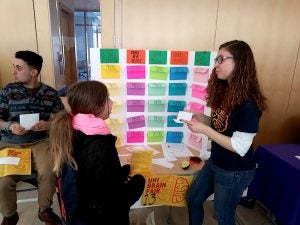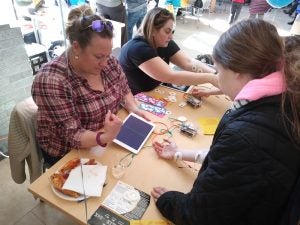Colleges of Pharmacy, Health Sciences take part in fair hosted by George & Anne Ryan Institute for Neuroscience

The second University of Rhode Island Brain Fair offered the public a chance to discover firsthand the amazing capabilities of our brains and explore brain health and science through creative activities.
The URI Brain Fair is sponsored by the George & Anne Ryan Institute for Neuroscience at URI and is part of the third annual Brain Week Rhode Island, a celebration of the wonder of our brains and brain science. The URI Brain Fair demonstrated how URI researchers are making great strides in combating neurodegenerative diseases and what we all can do to keep our brains healthy.
The free event on Sunday, March 18, was hosted in Avedisian Hall (College of Pharmacy), 7 Greenhouse Road, Kingston Campus.
Rachel Carley, a Class of 2020 doctor of pharmacy student, returned this year to again assist Pharmacy Professor Bongsup Cho in a 3-D tour of the brain. “I find that the 3-D brain tour is really fun because you see all different types of people in the theater audience. Those who understand the nuance of the brain and those who are just here to have fun and experience some of our amazing technology,” the West Greenwich resident said.
New attractions were presented, including a two-story-high neuron, which can be “fired” only through audience participation. Dendrites on the first-floor of Avedisian Hall were made of pressure-sensitive pads, and volunteers provided “inputs” to fire the neuron, sending electric impulses (called action potentials) up an open staircase to the second floor, where receipt of the message was signaled with lights or sound.
Also, Katharina Quinlan, assistant professor in the College of Pharmacy and the Ryan Institute, offered participants a chance to experience visuo-motor plasticity, or motor learning, with the help of prism goggles. Volunteers threw balls at a target without wearing the goggles and then donned a pair and tried again. Their vision will shift a noticeable 10 to 20 degrees, Quinlan said. “Participants will be fully aware of this visual shift, yet their ability to accurately throw the balls at a target will require practice to re-learn to aim,” she explained.

After removing the goggles, participants again took aim at the target. Many were surprised that they needed to re-learn to aim accurately with unaltered vision, Quinlan noted. “Hopefully this task will build a better appreciation for some of the tasks that our brains are constantly performing, which we take for granted.”
The College of Health Sciences was also represented, with kinesiology Professor Kim Fournier teaching attendees how their brains control muscle movement, and Department of Nutrition graduate student Alyssa Abreu hosting a “Jeopardy”-style game to quiz people about brain-healthy foods.
Throughout the day, URI faculty, students and staff from several disciplines will share their expertise in engaging and fun ways, including a brain nutrition quiz game, a demonstration of optical illusions, live music performances, healthy snacks and brain-themed giveaways, and a virtual reality encounter that simulates how a person with dementia experiences the world (adults only).
Register today to attend the URI Brain Fair or visit the event website to learn more.
